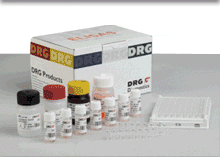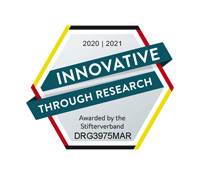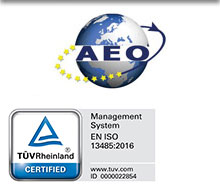02-Apr-2024
Installation of DYNEX DSX-Analyzer at DRG´s distributor A.T.M. Importadora in Cochabamba, Bolivia
More...
14-Mar-2024
DRG has re-established the distribution partnership with MERCODIA for the German market
More...
18-Jan-2024
Meet DRG at Medlab Middle East in Dubai, February 5-8
More...
24-Nov-2023
Review our New Infectious Diseases ELISAs Brochure
More...
3-Nov-2023
Our new brochure CMV IgG Buccal Swab ELISA is available!
Get your own copy!
More...
23-Oct-2023
DRG will be at MEDICA again!
Meet us in hall 3, booth A69
More...
29-Sep-2023
Meet DRG at the DKLM Congress in Mannheim, Germany
More...
28-Sep-2023
Diagnostics-4-Future Conference
DRG is official partner on this Conference in Konstanz, October 17-18
More...
27-Sep-2023
Spotlight to CMV IgG Buccal Swab ELISA
Learn about DRG´s UNIQUE test
More...
05-Sep-2023
Meet DRG at Medic West Africa 2023
26-28 September 2023 | Lagos, Nigeria
More...
17-Jul-2023
Meet DRG and BioCheck at AACC 2023
Booth #573 in Hall D
More...
30-Jun-2023
Spotlight to DRGs 17-OH Progesterone ELISA
Read more about this important diagnostic tool
More...
24-Apr-2023
Come to meet DRG at Euromedlab 2023
21 - 25 May in Rome
More...
31-Mar-2023
Spotlight to DRG´s DHT-optimized ELISA
Read more about one of DRG´s bestsellers
More...
13-Jan-2023
Meet DRG at Medlab Middle East in Dubai, February 6-9
More...
28-Oct-2022
Meet DRG at MEDICA 2022
(Booth 3/A69)
More...
21-Oct-2022
DRG´s new catalog is online
and can be downloaded.
More...
20-Oct-2022
DRG will be exhibiting at Africa Health / Medlab Africa
Oct 26-28, Johannesburg, South Africa
More...
04-Oct-2022
German Congress for Laboratory Medicine
Meet DRG in Mannheim, Oct 13-14
More...
12-Aug-2022
DRG Presents:
Procalcitonin (PCT) - Fully Automated on DRG:HYBRiD-XL
More...
19-Jul-2022
Diagnostics-4-Future 2022
Meet DRG at this Conference at Lake Constance in October
More...
28-Apr-2022
NEW Certificate EN ISO 13485:2016
More...
16-Feb-2022
DRG proudly announced the fully automated therapeutic drug monitoring (TDM) for ANTIBIOTICS with DRG:HYBRiD-XL
More...
14-Jan-2022
DRG will exhibit again at MEDLAB ME 2022 in Dubai!
Come and meet DRG at the worlds largest laboratory exhibition in the Middle East, January 24 - 27, 2022.
More...
29-10-2021
MEDICA 2021 - DRG will be live and present!
Meet us at our booth 3/A69
More...
30-Aug-2021
DRG can proudly announce:
The launch of Estriol total ELISA
More...
25-Aug-2021
Diagnostics-4-Future
Meet DRG at this Conference at Lake Constance in October 2021
More...
15-Jun-2021
DRG Launches The New Software Version v2.70 For DRG:HYBRiD-XL
More...
19-Nov-2020
DRG newly developed SARS-CoV-2 (RBD) Antibody ELISAs:
IgG quantitative and Total Ab (IgA, IgM, IgG)
More...
18-Nov-2020
DRG Intl, Inc. received MDSAP Certificate!
More...
16-Nov-2020
NEW high sensitive Estradiol ELISA for salivary samples
More...
19-Jun-2020
NEW: AMH (Anti-Mullerian Hormone) - fully automated - DRG:HYBRiD-XL
More...
18-Jun-2020
DRG proudly presents the launch of AMH ELISA
More...
24-Apr-2020
DRG awarded with a seal of approval "Innovativ Through Research"
More...
17-Feb-2020
NEW: Pancreatic Elastase (stool) - fully automated - DRG:HYBRiD-XL
More...
13-Jan-2020
DRG will participate at Labquality Days in Helsinki
Please visit us at booth C5!
More...
10-Jan-2020
DRG will exhibit at MEDLAB in Dubai
More...
23-Nov-2019
DRG is proud to announce the win of a Trophy at JIB in Paris
1st category: Processes and Technological Advances for Biological Analysis with Hepcidin 25 (bioactive) on DRG:HYBRiD-XL.
More...
05-Nov-2019
New assay for DRG:HYBRiD-XL:
Anti-tissue Transglutaminase & Anti-Deamidated Gliadin Peptide
More...
14-Okt-2019
DRG will participate at MEDICA 2019
Meet us at booth 3/A69!
More...
05-Jul-2019
Meet DRG at AACC 2019 in Anaheim
More...
14-Jun-2019
Salivary Hepcidin assay has been nominated
for SelectScience Scientists' Choice Awards for Best New Clinical Product of 2018!
More...
03-May-2019
Meet DRG at EuroMedLab 2019
More...
02-May-2019
DRG will participate at the 8th Congress of the International BioIron Society in Heidelberg
More...
16-Apr-2019
Iron Metabolism - New ELISA launched: sTfR
soluble Transferrin Receptor ELISA
More...
19-Mar-2019
First Salivary Assay for DRG:HYBRiD-XL launched: Cortisol
More...
06-Mar-2019
DRG Corticosterone ELISA
New application with rat and mouse!
More...
11-Jan-2019
DRG will exhibit at MEDLAB Middle East 2019!
More...
13-Dec-2018
DRG is launching a NEW and UNIQUE assay:
Salivary Hepcidin ELISA
More...
06-Nov-2018
Free T3 and Free T4 ELISA launched!
More...
18-Oct-2018
DRG @ MEDICA 2018 (Booth 3/A69)
Please meet us there!
More...
03-Sep-2018
New Diabetes Kits launched:
Ultrasensitive Insulin & C-Peptide
More...
16-Jul-2018
Salivary Hepcidin
Metabolomics Research - Special Feature
More...
04-Jul-2018
Please meet DRG @ AACC 2018!
Chicago, Booth #3438
More...
15-Jun-2018
DRG´s Optimized Saliva ELISAs
showcased at AACC 2018
More...
27-Feb-2018
New tumor marker assay for DRG:HYBRiD-XL: PSA
More...
23-Feb-2018
NEW DRG ELISA: AMH
New ELISA for the determination of Anti-Mullerian Hormone
More...
18-Dec-2017
DRG will exhibit at MEDLAB Middle East 2018!
More...
23-Nov-2017
DRG:HYBRiD-XL is featured in LABBook 2017
More...
09-Nov-2017
New assay for DRG:HYBRiD-XL: Tumor Marker CA72-4
More...
24-Oct-2017
Join DRG at MEDICA 2017
Hall 3 / A69
More...
12-Sep-2017
New Poster presented using DRG´s optimized Salivary Testosterone Kit
Learn more about the optimized features of this ELISA!
More...
04-Aug-2017
New assays for DRG:HYBRiD-XL: Beta hCG and Free Estriol!
Launched at AACC 2017!
More...
27-Jul-2017
Come meet us at AACC 2017!
San Diego, DRG Booth 5521
More...
21-Jul-2017
Optimized DRG ELISA: Salivary Estrone
Correlates perfectly with LC-MS/MS!
More...
26-May-2017
Dr. Geacintov 1930-2017
We regret to inform that our President and Founder of the company, Dr. Cyril Geacintov, passed away on Tuesday, May 23
More...
23-May-2017
Meet DRG at EuroMedLab in Athens
Hope to see you at DRG´s booth # 24.
More...
17-May-2017
New Posters published
at BioIron 2017 in Los Angeles, USA.
More...
09-May-2017
Longer Shelf Life:
AFP, FSH, Insulin for DRG:HYBRiD-XL
More...
10-Apr-2017
Posters published at MEDLAB Asia Pacific 2017
More...
28-Feb-2017
DRG will exhibit at MEDLAB Asia Pacific 2017 in Singapore!
Please visit our booth Q11.
More...
17-Jan-2017
DRG will exhibit at MEDLAB Dubai 2017!
More...
21-Oct-2016
New publication:
TM-CA 72-4 ELISA a useful diagnostic tool for Ovarian Cancer!
More...
12-Oct-2016
Join DRG at MEDICA 2016
Hall 3 / A69
More...
06-Sep-2016
DRG:HYBRiD-XL in Kyrgyzstan
Customer call at URF, DRG´s successful distributor!
More...
17-Aug-2016
NEW DRG ELISA: Salivary Progesterone HS ELISA
Correlates perfectly with LC-MS/MS!
More...
15-Aug-2016
DRG:HYBRiD-XL is online in LAB Book 2016!
More...
13-Jul-2016
Calprotectin: Completely automated on DRG:HYBRiD-XL!
More...
30-Jun-2016
Come meet us at AACC!
Philadelphia, August 02 - 04, 2016 - DRG Booth 3713
More...
01-Jun-2016
New DRG:HYBRiD-XL assay AFP is available!
More...
31-May-2016
DEQAS proficiency testing
25-OH Vitamin D (total) ELISA succesfully passed DEQAS testing!
More...
30-May-2016
Hepcidin Harmonization Study:
New Paper accepted by Clinical Chemistry
More...
25-May-2016
After-Show Report HOSPITALAR 2016
DRG presented DRG:HYBRiD-XL and new ELISAs
More...
29-Apr-2016
DRG exhibits at HOSPITALAR 2016!
Meet us in Sao Paulo, Brazil, May 17-20!
More...
31-Mar-2016
Meet DRG @ European Iron Club in Innsbruck
April 7-10, 2016
More...
12-Feb-2016
Award Ceremony of the German Design Award!
More...
10-Feb-2016
DRG will exhibit at MEDLAB Asia Pacific 2016 in Singapore!
Please visit our booth J 37!
More...
05-Jan-2016
DRG`s Hepcidin 25 (bioactive) HS
Presented At ASH Annual Meeting in Orlando (USA), December.
More...
21-Dec-2015
New assays for DRG:HYBRiD-XL: LH and Prolactin!
More...
14-Dec-2015
DRG exhibits at ARAB Health 2016!
Please visit our booth Z6 A19, Medlab section.
More...
12-Nov-2015
NEW DHT-optimized ELISA
Improved assay for detection of 5α-Dihydrotestosterone!
More...
28-Oct-2015
Unique assay for DRG:HYBRiD-XL:
Hepcidin 25 (bioactive)
More...
26-Oct-2015
German Design Award 2016
DRG:HYBRiD-XL is chosen!
More...
20-Oct-2015
Join DRG at MEDICA 2015
Booth Hall 3 / A69
More...
03-Sep-2015
New DRG:HYBRiD-XL assay Insulin is available!
More...
03-Aug-2015
German Design Award 2016
DRG:HYBRiD-XL is nominated!
More...
24-Jun-2015
Come meet us at AACC
Atlanta July 28–30, 2015 - DRG Booth # 819
More...
27-May-2015
After-Show Report HOSPITALAR 2015
Successful participation at the show in Brasil!
More...
31-Mar-2015
NEW ELISA
DRG announces Hepcidin 25 (bioactive) HS ELISA.
More...
27-Feb-2015
CRP-HS:
New clinical chemistry parameter now available for DRG:HYBRiD-XL!
More...
06-Feb-2015
DRG Events 2015
Our list of events is online now!
More...
27-Jan-2015
Press release:
Martina Werner, Member of the European Parliament, visited DRG!
More...
12-Jan-2015
HEPCIDIN
New paper published in "American Society of Hematology".
More...
08-Jan-2015
DRG will exhibit at ARAB HEALTH 2015!
More...
29-Nov-2014
DRG @ ASH Annual Meeting 2014 in San Franscisco
More...
28-Nov-2014
New DRG:HYBRiD-XL assays DHEA and DHEA-S are available!
More...
06-Nov-2014
D-dimer for DRG:HYBRiD-XL available now!
More...
24-Oct-2014
MEDICA 2014
DRG will exhibit at MEDICA in same booth location Hall 3 A69. Please book your meeting with us
More...
17-Oct-2014
New DRG:HYBRiD-XL assays TSH and free T4 are available!
More...
08-Oct-2014
DRG:HYBRiD-XL NEWS
Free Testosterone for DRG:HYBRiD-XL available now!
More...
20-Aug-2014
HbA1c for DRG:HYBRiD-XL available now!
More...
17-Jul-2014
Cystatin C
New clinical chemistry parameter now available for DRG:HYBRiD-XL!
More...
01-Jul-2014
Join DRG at AACC 2014!
Visit our booth at McCormick Place - Chicago, IL - Booth # 2431
More...
17-Jun-2014
DRG:HYBRiD-XL NEWS:
Androstenedione for DRG:HYBRiD-XL available now!
More...
13-Jun-2014
DRG Winner of MDEA 2014 Award
DRG:HYBRiD-XL has been selected as the Bronze Winner of MDEA 2014!
More...
27-May-2014
After-Show Report HOSPITALAR 2014
DRG presented DRG:HYBRiD-XL and new assays at HOSPITALAR
More...
26-May-2014
New DRG:HYBRiD-XL Parameters available!
T3, T4 and free T3 are now available for purchase.
More...
12-May-2014
DRG Events May 2014
Visit DRG booth at HOSPITALAR and House-of-Pharma
More...
09-May-2014
DRG:HYBRiD-XL Finalist in MDE Awards
Our fully automated analyzer DRG:HYBRiD-XL is Honored as Finalist in the Medical Design Excellence Awards 2014.
More...
30-Apr-2014
ECE 2014
DRG exhibits at the 16th European Congress of Endocrinology in Wroclaw, Poland and offeres live demos!
More...
28-Mar-2014
Arab Health 2014 - Post Show Report
The Arab Health Exhibition is growing from year to year...
More...
14-Feb-2014
DRG Events 2014
Our list of events in 2014 is online now!
More...
09-Jan-2014
ARAB HEALTH 2014
DRG will exhibit at ARAB HEALTH in Dubai. Please book your meeting with us.
More...
02-Dec-2013
DRG:HYBRiD-XL Testpanel launch
DRG has launched the first assays for DRG:HYBRiD-XL
More...
28-Nov-2013
DRG launched 2 new movies at MEDICA
Check it out!
More...
14-Oct-2013
MEDICA 2013
DRG will exhibit at MEDICA in same booth location Hall 3 A69. Please book your meeting with us
More...
09-Aug-2013
After-Show Report SMTLSA
DRG and Biocom Diagnostics succesfully presented the Combi-Stand at SMTLSA 2013
More...
23-Jul-2013
New DRG flyer online
DRG has published the new broshure about Iron Metabolism and DRG Hepcidin ELISA!
More...
05-Jul-2013
Exhibitions in July / August 2013
DRG will have a booth at AACC and SMTLSA
More...
31-May-2013
CTGF ELISA biomarker for chronic liver diseases!
A new study has shown that DRG CTGF ELISA might be a helpful non-invasive tool for monitoring chronic liver diseases.
More...
29-Apr-2013
Grand Opening Ceremony
DRG International Celebrates Opening of the New Corporate Headquarters
More...
05-Apr-2013
Exhibitions in April / May 2013
Visit DRG booth at ECCMID, EUROMEDLAB or HOSPITALAR
More...
22-Mar-2013
DRG @ CACLP 2013
DRG Group successfully showcased at the CACLP 2013 in Xi'an, China
More...
08-Mar-2013
Chlamydia and TORCH ELISAs CE certified!
DRG obtained the CE mark for 10 Infectious Diseases ELISAs!
More...
05-Mar-2013
DRG`s Progesterone and Cortisol ELISAs successfully used on wild whales and seals in Scotland
Results will be presented on Conference in Portugal
More...
07-Feb-2013
DRG Group at ARAB HEALTH 2013
DRG participated at one of the world´s largest medical congress: Arab Health in Dubai
More...
06-Dec-2012
More new DRG flyer online
DRG has published the new broshure about Aldosterone!
More...
28-Nov-2012
New DRG flyer online
DRG has published the new broshure about 25-OH-Vitamin D!
More...
02-Nov-2012
MEDICA 2012
DRG will present a spectacular media show!
More...
31-Oct-2012
New DRG flyer online
DRG has published the new broshure about Alzheimer research!
More...
15-Oct-2012
DRG:HYBRiD-XL
Showcased at 2012 "Pharmed and Healthcare Vietnam"
More...
20-Sep-2012
DRG:HYBRiD-XL® CE-marked!
DRG can declare that the fully automated analyzer fulfills standards for CE regulations!
More...
22-Jun-2012
AACC 2012
DRG exhibits again at the AACC Clinical Lab Expo and offeres live demos and a poster session!
More...
15-Jun-2012
DRG & VDGH
New image brochure of VDGH shows DRG: HYBRID-XL in a visually stunning scene!
More...
25-May-2012
After-Show Report HOSPITALAR
DRG and Biomedix succesfully presented the Combi-Stand at Hospitalar 2012
More...
11-May-2012
HOSPITALAR 2012
DRG is launching DRG:HYBRiD-XL to Latin America at HOSPITALAR in Sao Paulo, Brazil
More...
05-Mar-2012
DRG at MEDICAL FAIR INDIA 2012
DRG exhibited at MEDICAL FAIR INDIA in cooperation with authorized distributor Weldon Biotech
More...
09-Jan-2012
ARAB HEALTH 2012
DRG will exhibit at ARAB HEALTH 2012 in Dubai. Please book your meeting with us
More...
07-Nov-2011
MEDICA 2011
DRG will exhibit at MEDICA in same booth location Hall 3 A69. Please book your meeting with us.
More...
21-Sep-2011
Alzheimer's Research
The first test worldwide for the determination of serum auto-antibodies against Amyloid peptides is presented by DRG
More...
03-Sep-2011
New DRG Building officially dedicated!
The official dedication of the new addition to the DRG building took place on September 2nd in Marburg.
More...
29-Jun-2011
AACC 2011
DRG International Inc. exhibits again at the AACC Clinical Lab Expo 2011 and will also present a poster in new fields of research.
More...
23-May-2011
Medal of Honor
Cyril Geacintov, President and CEO of DRG Intl. awarded the Ellis Island Medal of Honor for his achievements as a business leader of diverse ethnic origin.
More...
14-Apr-2011
New certificate for DRG list B products available!
DRG has successfully passed this years surveillance audit (TUV Rheinland) and has extended the list of CE approved List B products. We are proud to present the new certificate.
More...
19-Jan-2011
AEO Certification:
In January 2011 DRG has obtained AEO status from the chief customs office in Giessen!
More...
29-Dec-2010
NEW: DRG Movie MEDICA 2010
DRG presented at MEDICA 2010 a new and innovative booth design. Watch our new MEDICA movie!
More...
13-Oct-2010
The Cornerstone Of The New DRG Building Addition In Marburg
The DRG Group is pleased to announce that the cornerstone of the new DRG building addition in Marburg was set in place
More...
11-Oct-2010
DRG Acquires DIMA Diagnostica from bioMérieux
DRG Instruments will acquire the microtiter plate Elisa production, including existing finished stock, raw materials, from DIMA, which is based in Germany.
More...
11-Aug-2010
DRG Renin-ELISA -
The worldwide first Sandwich-ELISA for the non-radioactive quantification of active Renin
In the United States, one third of the American adults have high blood pressure or hypertension, and among those, almost one third even do not know that they had the condition.
More...
21-Jul-2010
DRG to launch DRG:Hybrid-XL at AACC
DRG offers Preview of major new fully-automated immunodiagnostic and clinical chemistry automatic reader.
More...
01-Apr-2010
New article about the DRG Prolactin Elisa used in Angora goat plasma
DRG International, Inc. announces that researchers used the DRG Prolactin Elisa kit...
More...
23-Dec-2009
DRG presented DRG:HYBRiD-XL at MEDICA 2009
Unique, fully-automatic, random access analyzer for immunoassays and clinical chemistry to be available for use in 2011.
More...
24-Aug-09
WORLD'S FIRST HEPCIDIN TESTING KIT NOW AVAILABLE !
Test kit helps quickly diagnose iron disorders, including hemochromatosis and anemia.
More...



